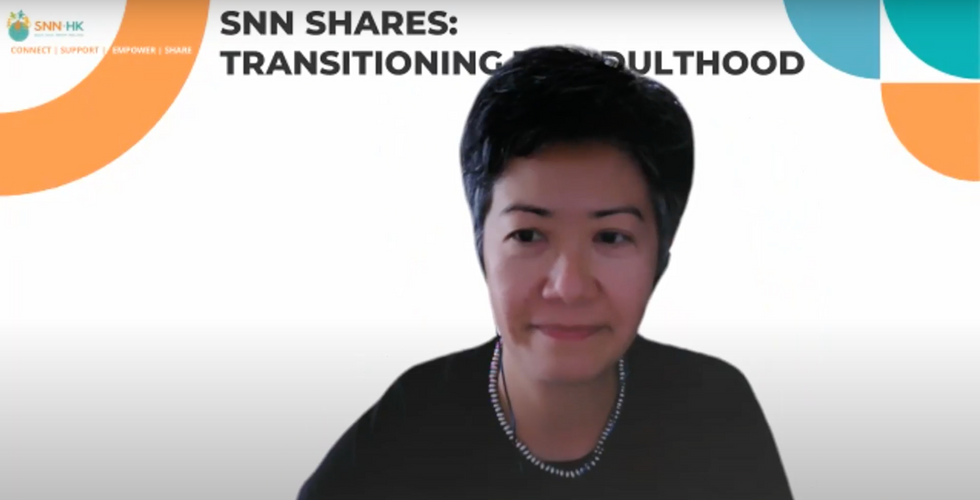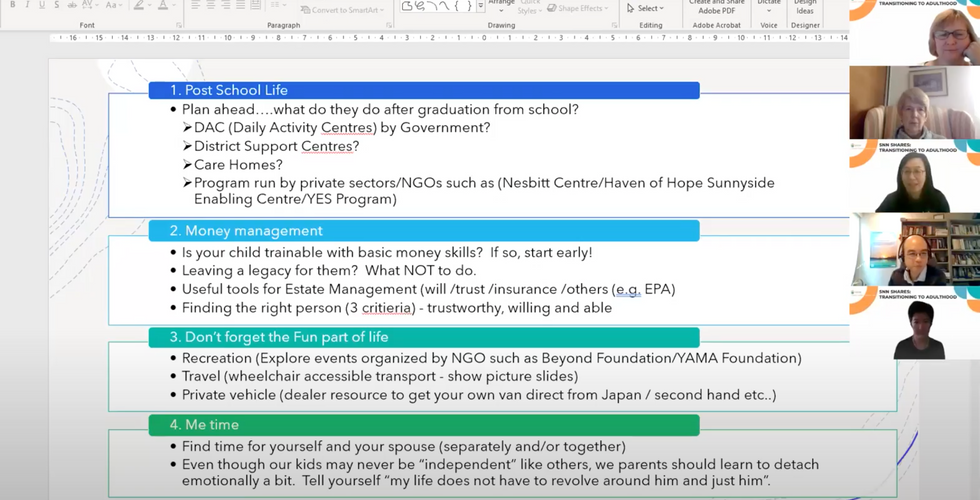SNN Shares: Transitioning to Adulthood 2022
- SNNHK
- Jan 31, 2022
- 7 min read
What lies ahead for our children’s future is a concern for every parent or caregiver, and for children with additional needs, the move from school years into adulthood can cause particular anxiety. Careful planning and support are key to a smooth transition. On Saturday 22 January, SNNHK was delighted to host a dynamic online panel of speakers who shared insights, experience and practical advice on Transitioning to Adulthood.
Alice Lee
Our first speaker and panel moderator was Alice Lee, Founder of Grow With Me and Co-Founder of Youth Empowerment Service, a post-school community-based transition programme based in Kowloon. Alice has 15 years of experience working directly with people with individual needs and their families and she gave some practical tips and advice on the transition from school into adulthood.
Alice explained there are five main considerations when considering the transition. Families should firstly consider what living arrangements are required: whether independent or supported and what specific needs your child has. Secondly, with regards to employment and finances, are they ready for paid or volunteer work, or self-employment? Which friends and relationships can be a source of support and are healthy for your child? Consideration of both mental and physical health should be a priority and, lastly, community participation where possible.
A person-centred approach to planning places the individual child or young adult at the centre of the discussion. Parents and caregivers should remember not to make any assumptions on behalf of the child. Ask what do they want to be? What are their aspirations and dreams? What do they do well?
Alice recommended some excellent open source (free) resources by Helen Sanderson Associates and The Preparing for Adulthood Review: A Good Practice Toolkit, which include easy-to-use templates that give structure to conversations. One point to note is that a facilitator can be used for these conversations and planning meetings, which takes some pressure off the family Often a neutral third party means that difficult, emotional or sensitive issues can be discussed more objectively, and parents may find this approach a breath of fresh air.
These charts can easily be created at home and Alice shared some examples of simple person-centred planning tools and communication charts. These tools help to address the person’s needs, reflect what is important to him or her, celebrate what is working and change what is not working for them. They offer a clear timeframe, have specific targets that are measurable, and identify who is accountable. In addition, your child may like to create a one-page profile to help share their aspirations and what they want people to know about them, particularly when meeting people for the first time.
Wendy Nesbitt
Our next speaker was Wendy Nesbitt, co-founder of Hong Kong’s Nesbitt Centre, which trains young adults with learning disabilities through vocational, education and social enterprises. Wendy shared the story of her daughter who is 49 years old and has intellectual disabilities. In 1979, the family moved to Hong Kong and realised that special needs classes were few and far between, and difficult to find. Laurie eventually attended the Sarah Roe Jockey Club School but when she graduated, Wendy and her husband David realised there were very few options for English-speaking children with additional needs after graduation.
Wendy explained at that time they considered three options: Moving back to Canada, which they didn’t want to do; sending Laurie to Canada by herself, which would have been a difficult choice; or thirdly, to try to do something in Hong Kong and make a difference. They chose the third option and set about lobbying the government, eventually getting support from the Social Welfare Department to set up a space and funding. They created the Hong Kong Vocational Centre, a charitable trust, which later changed its name to the Nesbitt Centre in 2007. Through the Nesbitt Centre, young adults have the ability to train and learn new skillsets. The Centre operates The Nest coffee shop in two locations and Café 8 at the Maritime Museum in Central. Wendy’s advice is “Don’t Give Up. Keep pushing – even if you have to be in people’s faces! Never Take No for an answer”.
Wendy also acknowledged that the transition to adulthood can be scary for parents, as your child wishes to become more independent and do things by themselves. She shared an anecdote of when Laurie managed to get a taxi from Mid Levels to Repulse Bay as a teenager with only HK$20 in her purse – not enough to cover the fare – but somehow she managed. Thankfully Hong Kong is a relatively safe place. Parents need to empathise with the child and find a way to help them make decisions, give them choices, and try to find a way to say yes rather than just saying no because that seems the easier route.
It is crucial to call on as many support services as you can. Wendy advises don’t give up hope and assume that your child can’t do anything – they will surprise you. Everyone is good at something and has some sort of talent. Always try to stay positive – and keep a sense of humour.
Dr Simon Ng
We were fortunate to welcome Dr Simon Ng, Assistant Professor of Law and Senior Programme Director at Hong Kong University, who shared his advice on the services currently available in Hong Kong and, as a parent, his advice on transitioning into adulthood. His son’s time at International College Hong Lok Yuen showed it to be a school which embraces diversity and has a robust plan for children with additional needs transitioning to adulthood.
Some changes that parents and caregivers need to be mindful of are the child’s need for autonomy and independence as well as their transition into “full legal personhood”, meaning they become fully in charge of their own life and rights and responsibilities, unless they do not have the capacity to do so. The kind of support and services they need will change, as does the parents’ role.
Simon emphasised the importance of having a plan for the transition, and ensuring that the person has independence and equality as a human being and citizen in a legal capacity. He acknowledged there is a service gap in Hong Kong and the best way to overcome this is through advocacy in a positive and constructive way. Conversation is important and you need friends and allies behind you. Be innovative and creative – if the service you want isn’t available – is it possible to band together and create it? Stepping up to find solutions was a theme common to all of our speakers – every one of them is a proactive parent used to advocating on their child’s behalf. At the same time, Simon recommends reaching out to different government and private services and networks to fully understand what is available. Some resources he mentioned are the New Life Psychiatric Rehabilitation Society, Heep Hong Society, SAHK and the Salvation Army (links available in the Resources shared with SNNHK members on our website).
Lilian Ma
Last but certainly not least was a hugely inspiring talk by Lilian Ma, who shared her experience with her son who is 23 years old and has high support needs. Lilian advised to keep in mind four key areas:
Post school life – it is important to plan ahead and use the support of various government services including Daily Activity centres, District Support Centres, Care Homes, or programmes run by NGOs such as Nesbitt centre, etc. Visit and look carefully to see if the provision and support level meets your child’s needs.
Money management – start early by training your child in basic money skills, and what not to do – a contract is a contract! One tip Lilian shared was taking care to structure your will so your child will be properly protected – seek good advice to avoid pitfalls where you child may not benefit appropriately.
Don’t forget the fun part of life – if your child uses a wheelchair, you may still have fun travelling – explore wheelchair accessible transport at home and overseas, and seek out recreation events organised with the right support from NGOs such as Beyond Foundation and YAMA Foundation.
Me Time – don’t feel guilty about finding time for yourself and your spouse, and even if your child may never be fully independent, parents should try and detach emotionally when possible. You can tell yourself that your life doesn’t have to revolve around your child and only them.
We had a fourth parent contributor who we would also like to thank for her very inspiring words and suggested resources for parents of children with ASD, which were very useful for our attendees.
During the Q&A session which followed the panel discussion, our members had the opportunity to submit questions in advance: including what to do in a facilitated meeting if your child is less able (answer: make sure there are people in the meeting that know your child very well). Another question was what kind of work would be suitable for young adults with additional needs, and Wendy answered that anything from folding pizza boxes to filing or similar jobs may be a good start. She noted the Nesbitt Centre always sends a support staff member with the young adult to a work placement initially, to ensure they are comfortable and have someone to go for lunch with, for example. Ongoing supervision of a job placement is also important to help the young person succeed. For young adults with physical disabilities but high cognitive skills, Alice shared various resources available such as the Shine Skill Centre.
Each of our speakers wrapped up with pieces of advice which included:
Open Up to Possibilities and Always Keep Moving!
Stay hopeful and talk to your child – every one of them has a skill – find that skill.
Don’t assume they can’t do anything – take risks and let them shine. Even for children with high support needs there is always something that can be done to help them transition.
The SNNHK Committee expresses our gratitude to all our speakers for their inspiring and useful presentations and generous sharing of knowledge. The Committee is continuing to plan and organize events that are relevant for our members for the Year of the Tiger. Stay tuned for our next events in March!



















Comments